小学英语同义词总结
- 格式:doc
- 大小:47.00 KB
- 文档页数:4
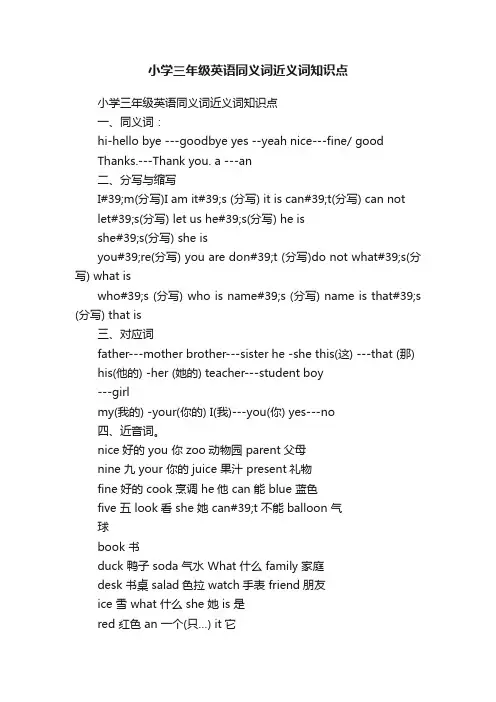
小学三年级英语同义词近义词知识点小学三年级英语同义词近义词知识点一、同义词:hi-hello bye ---goodbye yes --yeah nice---fine/ goodThanks.---Thank you. a ---an二、分写与缩写I#39;m(分写)I am it#39;s (分写) it is can#39;t(分写) can notlet#39;s(分写) let us he#39;s(分写) he isshe#39;s(分写) she isyou#39;re(分写) you are don#39;t (分写)do not what#39;s(分写) what iswho#39;s (分写) who is name#39;s (分写) name is that#39;s (分写) that is三、对应词father---mother brother---sister he -she this(这) ---that (那) his(他的) -her (她的) teacher---student boy---girlmy(我的) -your(你的) I(我)---you(你) yes---no四、近音词。
nice好的 you 你 zoo动物园 parent父母nine 九 your 你的 juice 果汁 present礼物fine好的 cook烹调 he他 can 能 blue 蓝色five 五 look看 she 她 can#39;t 不能 balloon 气球book 书duck 鸭子 soda 气水 What 什么 family 家庭desk 书桌 salad色拉 watch手表 friend朋友ice 雪 what 什么 she 她 is 是red 红色 an 一个(只…) it它read 阅读 ant蚂蚁 is 是bread 面包 and 和 it#39;s它是cat猫 ten十 lemon 柠檬hat帽子 pen 钢笔 melon 甜瓜五、同音词he#39;s他是---his他的 Oo----oh噢 Uu---you你六、复数1、直接加stable-tables book-books cat---cats goat----goats piano---pianos TV---TVs egg-eggs hat-hats2、辅音+ y 结尾,把y 改iesbaby---babies family-families3、特殊变化ox-oxen精品小编为大家提供的三年级英语同义词近义词知识点大家仔细阅读了吗?最后祝大家生活愉快。
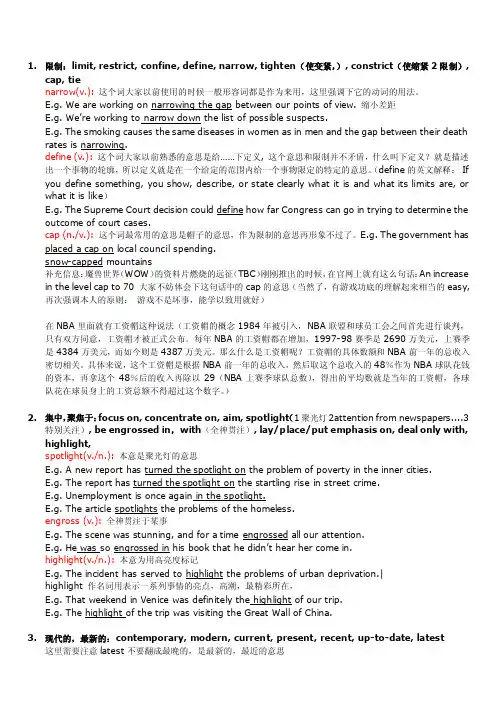
1.限制:limit, restrict, confine, define, narrow, tighten(使变紧,), constrict(使缩紧2限制),cap, tienarrow(v.):这个词大家以前使用的时候一般形容词都是作为来用,这里强调下它的动词的用法。
E.g. We are working on narrowing the gap between our points of view. 缩小差距E.g. We’re working to narrow down the list of possible suspects.E.g. The smoking causes the same diseases in women as in men and the gap between their deathrates is narrowing.define (v.):这个词大家以前熟悉的意思是给……下定义, 这个意思和限制并不矛盾,什么叫下定义?就是描述出一个事物的轮廓,所以定义就是在一个给定的范围内给一个事物限定的特定的意思。
(define的英文解释:If you define something, you show, describe, or state clearly what it is and what its limits are, or what it is like)E.g. The Supreme Court decision could define how far Congress can go in trying to determine theoutcome of court cases.cap (n./v.): 这个词最常用的意思是帽子的意思,作为限制的意思再形象不过了。
E.g. The government has placed a cap on local council spending.snow-capped mountains补充信息:魔兽世界(WOW)的资料片燃烧的远征(TBC)刚刚推出的时候,在官网上就有这么句话:An increase in the level cap to 70 大家不妨体会下这句话中的cap的意思(当然了,有游戏功底的理解起来相当的easy,再次强调本人的原则:游戏不是坏事,能学以致用就好)在NBA里面就有工资帽这种说法(工资帽的概念1984年被引入,NBA联盟和球员工会之间首先进行谈判,只有双方同意,工资帽才被正式公布。
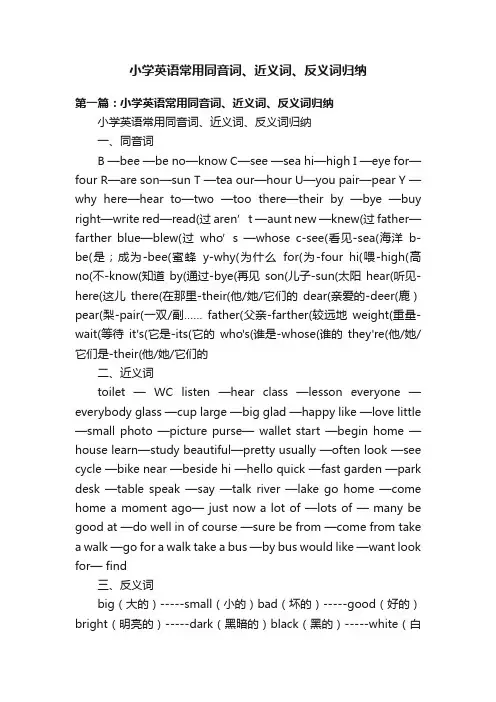
小学英语常用同音词、近义词、反义词归纳第一篇:小学英语常用同音词、近义词、反义词归纳小学英语常用同音词、近义词、反义词归纳一、同音词B —bee —be no—know C—see —sea hi—high I —eye for—four R—are son—sun T —tea our—hour U—you pair—pear Y —why here—hear to—two —too there—their by —bye —buy right—write red—read(过aren’t —aunt new —knew(过 father—farther blue—blew(过who’s —whose c-see(看见-sea(海洋b-be(是;成为-bee(蜜蜂y-why(为什么for(为-four hi(喂-high(高no(不-know(知道by(通过-bye(再见son(儿子-sun(太阳hear(听见-here(这儿there(在那里-their(他/她/它们的dear(亲爱的-deer(鹿)pear(梨-pair(一双/副…… father(父亲-farther(较远地weight(重量-wait(等待it's(它是-its(它的who's(谁是-whose(谁的they're(他/她/它们是-their(他/她/它们的二、近义词toilet —WC listen —hear class —lesson everyone —everybody glass —cup large —big glad —happy like —love little —small photo —picture purse—wallet start —begin home —house learn—study beautiful—pretty usually —often look —see cycle —bike near —beside hi —hello quick —fast garden —park desk —table speak —say —talk river —lake go home —come home a moment ago— just now a lot of —lots of — many be good at —do well in of course —sure be from —come from take a walk —go for a walk take a bus —by bus would like —want look for— find三、反义词big(大的)-----small(小的)bad(坏的)-----good(好的)bright(明亮的)-----dark(黑暗的)black(黑的)-----white(白的)beautiful(美的)-----ugly(丑的)cold(冷的)-----hot(热的)cool(凉爽的)-----warm(温暖的)come(来)-----go(去)cry(哭)-----laugh(笑)clever(聪明的)-----stupid(笨的)different(不同的)--same(相同的)difficult(难的)--easy(容易的)dirty(脏的)-----clean(干净的)day(白天)-----night (夜晚)early(早的)-----late(迟的)fast(快的)-----slow(慢的)glad(高兴的)---sad(悲伤的)inside(里面的)----outside (外面的)in(里面)-----out(外面)large(大的)-----little(小的)left(左)-----right(右)quiet(安静的)-----noisy(吵闹的)new(新的)-----old(旧的)loose(松的)-----tight(紧的)like (喜欢)-----hate(厌恶)open(开)-----close(关)quick(快的)-----slow(慢的)stand(站)-----sit(坐)short(矮的)-----tall(高的)short(短的)-----long(长的)thick(厚的)-----thin(薄的)thin(瘦的)-----fat(肥的)up(向上)------down (向下)wrong(错的)-----right(对的)weak(弱的)-----strong(强壮的)young(年轻的)-----old(年老的第二篇:小学英语常用同音词、近义词、反义词归纳小学英语常用同音词、近义词、反义词和对应词归纳1.同音词Bb—bee--be Cc—see--sea Ii--eye Rr--are小学英语常用同音词、近义词、反义词和对应词归纳1.同音词Bb—bee--be Cc—see--sea Ii--eye Rr--are Tt--tea Uu--you Yy--whyno--knowhi--high Tt--tea Uu--youYy--whyno--knowhi--high for--fourson--sunour--hourpair—pear here—hearto--two—toofor--fourson--sunour--hourpair—pearto--two—toothere--their here—hear there--their by—bye--buy right--writered--readaren’t--aunt who’s--whose meat--meet wear—where dear-deer weight-wait it's--its 2.近义词father--dad mother--mum--mom listen--hear glad--happygift—present like--love little--small photo--picturestart--beginplane—airplane learn—studybeautiful--prettyusually--often near—beside—near tohi--hellospeak—say--talk of course—sure be from —come from take a bus—by bus would like —want 3.反义词big--small bad--good black--white cold--hot cool--warm come--go different--same difficult--easy day--nightearly--latehappy--sadin--out left--rightquiet--activenew--oldopen--close stand--sit short—tall/long thin--fat up--down by—bye--buy right--writered--readaren’t--aunt who’s--whose meat--meet wear—where dear-deer weight-wait it's--its2.近义词father--dad mother--mum--mom listen--hear glad--happygift—present like--love little--small photo--picturestart--beginplane—airplane learn—studybeautiful--prettyusually--oftennear—beside—near tohi--hellospeak—say--talk of course—sure be from —come from takea bus—by bus would like —want3.反义词big--small bad--good black--white cold--hot cool--warm come--go different--same difficult--easy day--night early--latehappy--sadin--out left--rightquiet--activenew--oldopen--close stand--sit short—tall/long thin--fat up--down wrong--rightyoung--old behind--in front of stop—start/begin cheap--expensive/dear always--neverwrong--rightyoung--old behind--in front of stop—start/begin cheap--expensive/dear always--never west--east north--south here--there after--before west--east north--south here--there after--before 4.对应词this--that these--those man--woman boy--girl uncle--aunt grandmother—grandfather father--mother sister—brotherson--daughteractor—actress student--teacher tomorrow—yesterday 小学英语常用不规则动词及过去式amis—wasare--werego--wentdo(does)--did fly--flew make--made sing--sang have(has)--had eat--ate read--readsee--sawget--got take--tookbuy--boughtleave--leftswim--swam win--won小学英语一些特殊单词的复数形式child--children man--men woman—women mouse-mice foot--feet tooth--teeth goose--geese knife--knives leaf--leaves city--cities tomato--tomatoespotato—potatoes hesheit—they himherit—them I—we me--us this—these that--those sheep--sheep deer--deer Chinese--Chinese小学英语中常见不可数名词water tea juice coffee milk rain bread rice meat pork beef mutton chicken hair4.对应词this--that these--those man--woman boy--girl uncle--aunt grandmother—grandfather father--mother sister—brotherson--daughteractor—actressstudent--teacher tomorrow--yesterday小学英语常用不规则动词及过去式amis—wasare--werego--wentdo(does)--did fly--flew make--made sing--sang have(has)--had eat--ate read--readsee--sawget--got take--tookbuy--boughtleave--leftswim--swam win--won小学英语一些特殊单词的复数形式child--children man--men woman—women mouse-micefoot--feet tooth--teeth goose--geese knife--knives leaf--leaves city--cities tomato--tomatoes potato--potatoes hesheit—they himherit—them I—we me—us this—these that--those sheep--sheep deer--deer Chinese--Chinese小学英语中常见不可数名词water tea juice coffee milk rain breadrice meat pork beef mutton chicken hair第三篇:小学英语常用同音词、近义词、反义词归纳小学英语常用同音词、近义词、反义词归纳一、同音词B—bee—be no—know C—see—sea hi—high I—eye for—four R—are son—sun T—tea our—hour U—you pair—pear Y—why here—hear to—two—too there—their by—bye—buy right—write red—read aren’t—auntnew—knew father—farther blue—blew who’s-whosec-see-sea b-be-bee y-whyfor-four hi-high no-know by-bye son-sun hear-here there-their dear-deerpear-pair father-fartherweight-wait it's-itswho's-whose they're-their二、近义词toilet —WC listen —hear class —lesson everyone —everybody glass —cup large —big glad —happy like —love little —small photo —picture purse—wallet start —begin home—house learn—study beautiful—pretty usually —often look —see cycle —bike near —beside hi —hello quick —fast garden —park desk —table speak —say —talkriver —lake go home —come home a moment ago—just now a lot of —lots of — manybe good at —do well in of course —surebe from —come from take a walk —go for a walktake a bus —by bus would like —want look for— find三、反义词big(大的)-----small(小的)bad(坏的)-----good(好的)bright(明亮的)-----dark(黑暗的)black(黑的)-----white(白的)beautiful(美的)-----ugly(丑的)cold(冷的)-----hot(热的)cool(凉爽的)-----warm(温暖的)come(来)-----go(去)cry(哭)-----laugh(笑)clever(聪明的)-----stupid(笨的)different(不同的)--same(相同的)difficult(难的)--easy(容易的)dirty(脏的)-----clean(干净的)day(白天)-----night (夜晚)early(早的)-----late(迟的)fast(快的)-----slow(慢的)glad(高兴的)---sad(悲伤的)inside(里面的)----outside (外面的)in(里面)-----out(外面)large(大的)-----little(小的)left(左)-----right(右)quiet(安静的)-----noisy(吵闹的)new(新的)-----old(旧的)loose(松的)-----tight(紧的)like(喜欢)-----hate(厌恶)open(开)-----close(关)quick(快的)-----slow(慢的)stand(站)-----sit(坐)short(矮的)-----tall(高的)short(短的)-----long(长的)thick(厚的)-----thin(薄的)thin(瘦的)-----fat(肥的)up(向上)------down (向下)wrong(错的)-----right(对的)weak(弱的)-----strong(强壮的)young(年轻的)-----old(年老的一系动词、助动词与副词的缩写isn’t=is notcan’t=can nothaven’t=have not hasn’t=has notaren’t=are notdon’t=do not doesn’t=does notwon’t=will not 二代词与系动词的缩写I’m=I amit’s=it ishe’s=he is she’s=she isthat’s=that isyou’re=you are they’re=they arewe’re=we are三疑问词与系动词的缩写Who’s=who ishow’s=how iswhen’s=when is What’s=what iswhere’s=where is四代词与助动词的缩写I’d=I wouldwe’ll=we willwe’ve=we have he’s=he has小学英语反义词和对应词名词man---woman boy---girl grandpa/grandfather---grandma / grandmotherfather---motheruncle---auntson---daughter brother---sisterMr---Ms/Mrsleft---rightday---nighteast---westnorth---southking---queen 动词come---goopen---closesit---standcry---laughask---answerbuy---sellsleep--waketake--bring teach--learn 形容词big—smallblack—whitefat— thinlate —earlylong —shorttall— shortbad —goodhappy---sadcold —hotwarm—coolyes— nofar —nearright —wrongsame —differentquick / fast — slownew —oldyoung— oldcheap--expensive/dear clean---dirty clever---foolishdark---bright/lempty---fulleasy---difficult/ hardhungry---fullfirst---lastlight---heavypoor---rich busy —freesafe--dangerousquiet---noisy代词he---shehis---herhis---hersthis---thatthese---thosenothing---everythingnone---all 副词和介词up---downafter---beforehere---there inside---outsidenow---then with--withoutin---out英语单词分类一、食物和饮料(food and drink)food hamburger sandwichcakebreadhot dogricenoodles dumplingpizzabiscuiteggmoon cakesweetsice creampeanutsfast foodcheese meat ———chickenfishsausagevegetables——tomatopotatofruit———applepearbananaorangemangowatermelon drinkwaterteacokecoffeejuicemilksoybean milksoup二、颜色(colours)white black red green yellow blue brown purpleorange pink三、家庭成员(family members)grandparents—grandpa / grandfather,grandma / grandmothergrandchildrenparents—father / dad, mother / mumuncleauntsondaughterbrothersistercousin四、数字(numbers)one 2 two 3 three four five six seven eight nine 10 ten 11 eleven twelve thirteen fourteen 15 fifteen sixteenseventeen 18 eighteen 19 nineteen twenty twenty-onetwenty-two twenty-three twenty-four twenty-five 26 twenty-six twenty-seven 28 twenty-eight twenty-ninethirtythirty-twothirty-threethirty-fourthirty-five 36 thirty-six thirty-seventhirty-eightthirty-nine 40 fortyforty-oneforty-twoforty-threeforty-fourforty-fiveforty-sixforty-seven 48 forty-eight forty-ninefiftyfifty-onefifty-twofifty-threefifty-fourfifty-fivefifty-sixfifty-sevenfifty-eightfifty-ninesixtysixty-onesixty-twosixty-three 64 sixty-foursixty-sixsixty-sevensixty-eightsixty-nineseventyseventy-oneseventy-two 73 seventy-three 74 seventy-four 75 seventy-five 76 seventy-six 77 seventy-seven 78 seventy-eight 79 seventy-nineeightyeighty-oneeighty-twoeighty-threeeighty-four 85 eighty-fiveeighty-sixeighty-seveneighty-eight 89 eighty-nineninetyninety-one 92 ninety-twoninety-threeninety-fourninety-five 96 ninety-sixninety-sevenninety-eightninety-nineone hundred五、职业名词(jobs)teacherpupildoctornurseworkerfarmerdriverdancerpilotwritersingerwaiter actorlibrarianplayerpolicemanfairman六、身体部位(body)headhaireyeearnosefacemouthtooth(teeth 复)armhandlegfoot(feet 复)(shoulder, knee, toe, finger, stomach) 七、运动名词(sports)football basketballtable tennisbaseballrunningswimmingskatinghigh jumplong jumpskippingmorning exerciseswinner 八、四季(seasons)springsummerautumn / fallwinter九、月份(months)JanuaryFebruaryMarchAprilMayJuneJulyAugustSeptemberOctober NovemberDecember 十、一周七天(seven days of a week)Sunday MondayTuesdayWednesdayThursdayFridaySaturday十一、交通方式(transportation)on foot / walkby bikeby busby carby taxiby trainby ship /boatby plane十二、动物(animals)dogcatchick / hen / cockduckhorsecowsheep pigmonkeytigerlionelephantpandabearfishbirdrabbitfrogdragon十三、天气(weather)sunny /fine cloudywindyrainysnowycoldhotwarmcool十四、学习用品(school things)classroom blackboarddeskchairschoolbagbookpenpencilrulereraserpencil-boxdictionaryexercise booknewspapertimetablecardpicturelibrary card十五、衣物名词(clothes)hat /capcoatdressshirtT-shirtblousetrousersskirtsock(s)shoe(s)sweater十六、公共场所(public places)school playgroundparkzoohospitalfactory libraryfarm cinema shopsupermarketairportstationhouse restaurantsquare十七、感觉形容词(feeling)coldhotcoolwarmhungrythirstytiredboredhappysadangryexcitedsickterrible十九、时间名词(time)hour morningafternoonnightdayweekweekendmonthseasonyearyesterdaytodaytomorrowtonight/this evening this morning/ afternoon this yearone daysome day二十、家居用品roombedroombedbathroomdeskchairclocklight / lampphotolanternumbrelladoorbellfridgelineboxbottlepocketknifebowlplatechopsticksforkshopping liststamptoothbrushTV(television)computertelephone/phoneradioCD-ROMcamera二十二、学科(subjects)ChinesemathsEnglishsciencemusicPEmusic 二十三、节日(festivals)Spring Festival Mid-autumn FestivalNew Year’s DayDragon Boat FestivalChildren’s DayTeachers’ DayChritmas二十四、特殊疑问词what —— what colourwhat timewhat dayhow —— how manyhow muchhow oldhow longhow tall wherewhenwhowhosewhywhich第四篇:小学英语总复习-反义词、近义词、对应词、同音词小学英语反义词、对应词、同音词、同义词1.反义词(1)quick快的(2)laugh笑(3)fast 快的、快地(4)close 关(5)in在…里面(6)inside里面的(7)behind在…后面(8)bottom在…底部(9)before在…之前(10)on在…上面(11)above在…上面(12)right 右的、对的(13)old旧的、年老的(14)short短的、矮的(15)thin薄的、瘦的(16)full 饱的、满的(17)like喜欢(18)cheap便宜的(19)slower较慢的(20)stop停(21)north北(22)west西(23)here这里(24)always总是(25)dirty脏的(26)strong强壮的(27)high高的(28)win赢(29)pass 通过;及格(30)dayslow慢的 cry哭slow快的, slowly 快地 open开 out在…外面 outside外面的 in front of在…前面 top在…顶部 after在…之后 under在…下面 below 在…下面left 左的、wrong错的new新的、young年轻的long长的、tall 高的thick厚的、fat 胖的hungry 饿的、empty空的dislike不喜欢、hate 厌恶expensive/dear昂贵的quicker/faster较快的begin / start开始south南east东there那里never从不clean干净的weak虚弱的low低的 lose 输fail 未通过;不及格night(31)happy高兴的(32)come来(33)big大的(34)good好的(35)hard困难的(36)far远的(37)first首先(38)heavy重的(39)early早的(40)sleep 睡觉(41)sit坐(42)cold寒冷的(43)white白的(44)cool凉爽的(45)up向上(46)yes是(47)safe安全的(48)same一样的(49)dark 黑暗的(50)wet潮湿的(51)much大量(52)(53)(54)(55)(56)(57)(58)(59)(60)sad伤心的 go去 small小的 bad坏的 easy容易的 near近的 last 最后 light轻的 late迟的wake 醒来stand站 hot炎热的 black黑的 warm暖和的 down向下 no不是dangerous危险的different不同的bright光明的dry干燥的little少量2.对应词sister姐妹 that那个 grandmother奶奶 woman女人aunt阿姨 evening晚上 yesterday昨天(1)brother兄弟(2)this这个(3)grandfather爷爷(4)man男人(9)uncle叔叔(10)morning早上(11)tomorrow明天(12)waitress女服务员waiter南服务员(5)daughter女儿(6)mother妈妈(7)these这些(8)girl女孩3.同音词(1)sea海洋(2)meat肉(3)I我(4)too也(5)sun太阳(6)hour小时(7)know知道(8)for给(9)buy买(10)wear穿(11)whose 谁的(12)father 父亲(13)May五月(14)eight八(15)one一(16)weather天气(17)road路son儿子 father爸爸 those那些 boy男孩see看见 meet遇见 eye 眼睛 two二 / to son儿子 our我们的no不 four四bye再见 by通过 where哪里who' s 是谁 farther 较远may可以ate吃(eat的过去式)won赢(win的过去式)whether是否rode骑(ride的过去式)2(13)red红的(14)wife妻子(15)girlfriend女朋友(18)pear 梨(19)be 是(20)right对的(21)deer 鹿(22)hear 听(23)high高的(24)there那儿(25)weak 弱(26)red(红色的)(27)knew知道(28)aunt(姑;姨;婶)(29)its 它的(30)whole全部的(31)knows知道(32)(33)(34)green绿的 husband丈夫 boyfriend男朋友pair一对;一双bee 蜜蜂write写dear亲爱的here这儿hi你好their他们的week周 read读 new新的 aren' t 不是It’s 它是 hole洞眼 nose鼻子4.同义词(1)above(2)father(3)kid(4)glad(5)fast(6)mother(7)below(8)hello(9)plane(10)much(11)few (12)small(13)big(14)picture(15)movieon dad child happy quick mum under hi airplane many little little large photo film(16)bike(17)under(18)evening(19)speak(20)see(21)hear(22)love(23)gift(24)laugh(25)shop(26)hate(27)learn(28)dear(29)begin(30)fasterbicycle below night talk/say watch/look listen love present smile store dislike study expensive start quick第五篇:小学英语五年级(上)同音词、近义词、反义词、对应词归纳小学英语五年级(上)同音词、近义词、反义词、对应词归纳(沪教2011课标版三年级起点)一、同音词by(表示方式、靠近)——buy/bye(买/再见)hour(小时)——our(我们的)their(他们的)——there(在那)sea(海)——see(看见)know(知道)——no(不)blew(blow吹过去式)—— blue(蓝色)二、近义词(同义词)want(想要)——would like begin(开始)——start clever(聪明的)——smart/bright gently(和缓地,温柔地)——softly三、反义词interesting(有趣的)——boring(无聊的)always(总是,一直)——never(从不)same(相同的)——different(不同的)heavy(重的,沉的)——light(轻的)easy(容易的)——hard(难的)slowly(缓慢地)——quickly/fast(快地,迅速地)gently/softly(和缓地,轻柔地)—— strongly(强劲地)right(正确的)—— wrong(错误的)四、对应词bring(带来)——take(带走)ask(问)——answer(答)left(左边)——right(右边)up(向上)——down(向下)inside(在……里面)——outside(在……外面)hate(讨厌)—— love/like(爱/喜欢)。
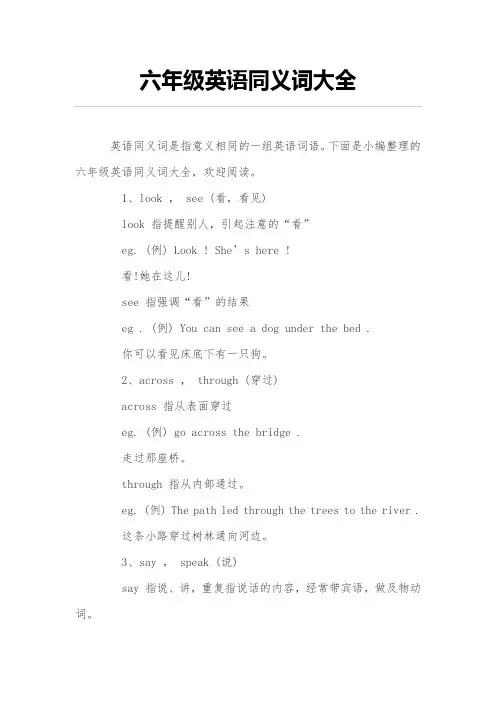
六年级英语同义词大全英语同义词是指意义相同的一组英语词语。
下面是小编整理的六年级英语同义词大全,欢迎阅读。
1、look , see (看,看见)look 指提醒别人,引起注意的“看”eg. (例) Look ! She’s here !看!她在这儿!see 指强调“看”的结果eg . (例) You can see a dog under the bed .你可以看见床底下有一只狗。
2、across , through (穿过)across 指从表面穿过eg. (例) go across the bridge .走过那座桥。
through 指从内部通过。
eg. (例) The path led through the trees to the river .这条小路穿过树林通向河边。
3、say , speak (说)say 指说、讲,重复指说话的内容,经常带宾语,做及物动词。
eg . (例) He said that he was busy .他说他很忙。
Speak 说话、演讲,着重强调说的动作,不注重说的内容,一般做不及物动词。
做及物动词时的宾语只能是语言或truth (真理、事实)eg . (例) Do you speak Chinese ?你说汉语吗?The baby is learning to speak .这孩子们在学习讲话。
4、borrow , lend (借)borrow 从主语角度讲是“借来,借进”,常为“borrow sth . From sb .”。
eg .(例) She borrowed some books from your sister .她从你姐姐那里借来了一些书。
lend 从主语的角度讲是“借出”,常为“lend sth . to sb .”或“lend sb . sth .”eg .(例) He lent me a pen .他把钢笔借给我。
5、correct , right (正确的)c orrect “正确的,恰当的”,有纠正的含义,较正式,可做动词。

小学英语五年级(下)同音词、近义词、反义词、对应词归纳
(沪教2011课标版三年级起点)
一、同音词
buy(买)——bye/by(再见/靠近)
week(周,星期)——weak(弱的)
meet(迎接,会见)——meat(肉)
knew(know知道的过去式)——new(新的)
二、近义词(同义词)
cap(无帽边或前有帽舌的帽子)——hat(有檐的帽子)
film(电影)——movie
boat(小船,舟)——ship(轮船)
smile(微笑)——laugh(大笑)
present(礼物)——gift
kind(友好的,体贴的)——friendly
三、反义词
early(早,提早)——late(晚,迟到)
wrong(错误的)——right(正确的)
finally(最后)——first(首先)
last(最后的)——first(第一的)
be weak in(不擅长)——be good at(擅长)
四、对应词
hers(她的)——his(他的)
north(北方,向北)——south(南方,向南)
stand(站)——sit(坐)
cry(哭)——smile/laugh(笑)。
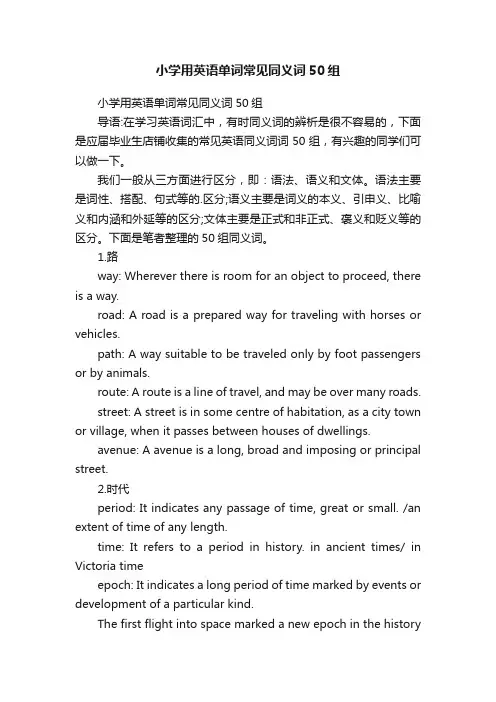
小学用英语单词常见同义词50组小学用英语单词常见同义词50组导语:在学习英语词汇中,有时同义词的辨析是很不容易的,下面是应届毕业生店铺收集的常见英语同义词词50组,有兴趣的同学们可以做一下。
我们一般从三方面进行区分,即:语法、语义和文体。
语法主要是词性、搭配、句式等的.区分;语义主要是词义的本义、引申义、比喻义和内涵和外延等的区分;文体主要是正式和非正式、褒义和贬义等的区分。
下面是笔者整理的50组同义词。
1.路way: Wherever there is room for an object to proceed, there is a way.road: A road is a prepared way for traveling with horses or vehicles.path: A way suitable to be traveled only by foot passengers or by animals.route: A route is a line of travel, and may be over many roads.street: A street is in some centre of habitation, as a city town or village, when it passes between houses of dwellings.avenue: A avenue is a long, broad and imposing or principal street.2.时代period: It indicates any passage of time, great or small. /an extent of time of any length.time: It refers to a period in history. in ancient times/ in Victoria timeepoch: It indicates a long period of time marked by events or development of a particular kind.The first flight into space marked a new epoch in the historyof mankind.era: It refers to a very long period of time marked by a particular feature in a great new era of world revolution age: It shows a particular /a fairly definite period in history. the Bronze Age, Iron Age3.战斗fight: It is a bodily strugglestruggle: An effort of any kind to overcome difficulty.battle: A fight between armed forces.campaign: A series of related military operations in a war.war: A period of fight between countries or states whenweapons are used and many people are killed.combat: A fight, conflict, controversy.4.牧师priest: A person, esp. a man specially trained for various religious duties and ceremonies, in the Christian church, esp. in the Roman Catholic churchminister: A member of clergy, esp. Protestant churches.clergy: The officially appointed leader of the religious activities of a particular church or temple.clergyman: clergymen a member of clergy.pastor: A Christian religious leader in charge of a church and its members, esp. in a Protestant church.vicar: A priest in charge of an area in the church of England.father: A little of respect for a priest, esp. in the Roman Catholic.5.服装clothing: General term of clothes.clothes: Coverings of the body such as coats,dresses, suits, shoes, hats.garment: A suit of clothes used by actors./a single article of clothing.costume: 1) The fashion of dress peculiar to a people, nation, class, period, etc.2) A dress worn by actors in a play. uniform: worn by all members of the community.dress: 1) A kind of outer garment worn by women .2) worn on special occasions evening dress/ morning dresssuit: A set of outer clothes to be worn together. evening suit/swimming suitcoat: A garment with sleeves worn on top of other clothes from rain, heat, etc.overcoat: A warn coat worn in the street.6.哭cry: The most general one.weep: To let flow tears.sob: To weep or sigh with short quick breaths.snivel: To sniffle and cry in a irritating manner.blubber: T o cry loudly noisily.whine: To make a low complaining cry.bawl: To utter loud cries .wail: To cry aloud from pain or sorrow.moan: To make a low, miserable sound in pain or sorrow.grown: To make a low sound of pain, unhappiness or disapprovalmourn: To feel or show sadness or sorrow for someone who has died.lament: To express great sorrow or regret.7.美丽漂亮good-looking: Having an attractive appearance in a strong,healthy way used for men and women not things.beautiful: Suggesting symmetry of features or perfection of proportion, elegance and mobility. beautiful flowers, a beautiful girl/voice/city/face beautiful weather.handsome: Of attractive appearance applies to men. a handsome fellow/actor/horse/buildings/young man.pretty: Suggesting liveliness and sweetness, pleasing or nice to look at. a pretty little woman/garden, a pretty girl/ picture/piece of music,lovely: So beautiful that it makes you feel good to look at it or even to think about it. The garden looks lovely.fair: Beautiful light in color esp., skin hair.gorgeous: Extremely beautiful or handsome.8.拉拖pull: The most general one.draw: It implies a smoother, steadier motion and generally a lighter force than pull.drag: It usually refers to horizontal motion or motion up an incline and it suggests laborious efforts over rough ground or against friction, resistance or gravity.The escaped prisoner was dragged out of his hiding place.haul: It implies continuous pulling or dragging of heavy or bulky objects.The fisherman is hauling a net.tug: It applies to hard often sudden violent effort to pull.He tugged at my sleeve to ask directions.jerk: To pull suddenly.He jerked out the knife that was stuck in the wound.tow: To pull by a rope or chain. We towed the car to the nearest garage.wrench: To pull hard with a twisting or turning movement.9.旋转turn: The most general one.spin: To turn quickly around a central point.It emphasizes the continuity of the action, and usually the narrow extent of the circular motion.The wheel is spinning on its axis.whirl: To round very fast.It implies the lock of conscious control.The leaves whirl in the wind in the yard.rotate: To turn round a fixed point with a circular movement.The earth rotates once every 24 hours.revolve: To turn or move in a circle around a central point.It indicates circular or elliptical movement.The planets revolve around the sun.10.生气气愤anger: The most general one.be cross: Feeling easy to get angry.indignation: Anger.It stresses righteous anger at what one considers unfair, mean or shameful.We expressed our indignation at the ruthless exploitation.wrath: Very treat anger.It suggests a desire on intent to revenge or punish.rage: Wild, violent anger.It suggests loss of self- control from violence of emotion. in a rage /to fall into a rage.fury: Violent, extreme and destructive anger.She flew into a fury.11.错误mistake: A wrong thought, act. It implies carelessness Anyone can make a mistake.fault: A bad point, but not of a serious moral kind. It refers to behavior and character. His only fault is that he lacks ambition.find fault with sb / at fault shortcoming: Weakness, failingIt refers to failures or deficiencies in things as well as people.In spite of all her shortcomings I still think she's one of the best teachers in the school.error: A mistakeIt implies deviation from a standard or modelThe accident was caused by human error.defect: sth lacking or imperfect.It refers to quality.The radio was returned because of a defect.blunder: A very stupid or unnecessary mistake.It implies ignorance.This is the fatal blunder of his life.12.图画picture: The most general one.painting: pictures with color.drawing: A picture made with a pen, pencil and crayon. Sketch, diagrams and graphs are all drawings.sketch: A rough not detailed drawing.diagram: A drawing, figure that shows the arrangement of something.graph: A diagram in which a straight line, curved, or zigzag line shows how two sets of numbers or measurements are related.illustration: A picture to go with words of a book.draft: The first rough written form of anything.plan: A line drawing of a building as it might been seen fromabove.elevation: A flat upright side of a building.chart: A map esp. a detailed map of a sea area.13.特别special: Different in some way from what is common, ordinary, or usual.It stresses having a quality, character, identity, or use of its own.The tube contains special gases.especial: To an usually great degree, exceptionalIt emphasizes the importance of the things or the persons mentionedThis is a matter of especial importance.particular: Relating or belonging to only one thing or person.It stresses the distinctness of something as an individual which is worth notice. In that particular case, the rule doesn't hold.specific: Detailed and exact, clear in meaning and explanation, fixed, determined.It implies a quality or character distinguishing a kind or a species.He gave me a very specific instruction. There is a specific tool for each job.peculiar: Strange or perhaps unpleasant.It implies strangeness. He has a peculiar way of speaking.14.取消消灭cancel: To give up, to declare something is to be effective.He has cancelled his leave of absence.abolish: T o do away with. It refers to practices, social institutions. Bad customs should be abolished.eliminate: To get rid of.We should eliminate the false and retain the true.repeal: To bring to an end of the effect of a law or an order. Some laws should be repealed.exterminate: To destroy completely and wholly.Colonialism must be exterminated.15.破碎break: The most general one.crush: To press together violently as to break, to destroy its shape by squeezing it. It suggests the effect of great external pressure.The tree fell on top of the car and crushed it.smash: To break thoroughly to pieces with a crushing sound.She dropped the plate and smashed it.crack: To break without separation of parts.It suggests the breaking out across a surface.He cracked the window by leaning against it.burst: To break open by pressure from within.The fireworks burst while they were in the air.shatter: To break into pieces.It suggests the breaking up of a thin surface.The glass was shattered to pieces.crash: To refer to the vehicle which hits something and is badly damaged.16.环境形势conditions: The location and other factors likely toaffect it. It suggests something that has stayed the same for some time and which affects daily life such as food, work, and houses.We are now studying the economic conditions in the developing countries.situation: A position or state at a particular time, set ofconditions, facts, and events having an effect on a person, society, etc.It suggests more general matters such as government planning and finance.The political situation in these countries are always changing.environment: The circumstances, things and conditions that influence you. It refers to spirit aspect, physical aspect and material aspect. We must try to beautify our environment.circumstance: A situation or event around us, a certain kind of atmosphere, the conditions that affect what happens. in the circumstancessurrounding: The area and environment around a place orperson. It indicates a very narrow condition, physically sometimes reflects spiritual aspect.They lived in hostile surroundings.17.著名的well-known:famous: The most general one. widely known or honored.distinguished: Great, outstanding marked by excellent quality or deserved fame, used especially of people who are famous for serious work in science, the arts etc.He was a distinguished writer.celebrated: Famous,It refers objectively to sb or something that has been give acclaim or honoured with awards or prizes. She was a celebrated actress.renowned: Highly honored and famous for something good. often refers to places or things, also It suggests something that has become legendary or is no longer available for an objective evaluation.Edison was renowned for his inventions.noted: Well-known and admiredIt often describes a more intellectual kind of effort and accomplishment indicating an authority or expert or their theories. Maybe it is not widelyknown to the general public. He was a very noted expert.notorious: Famous for something bad.He is notorious for his crimes.18.强盗thief: The most general one.robber: It suggests a direct confrontation in which the owner is forced to give up his valuables.mugger: A person who attacks and robs people in a street or in a lift.burglar: A person who breaks into a house at night to steal something.gangster: A member of a group of criminals, esp. those who arearmed and use guns to threaten.bandit: an armed robber.It suggests an organized group in a rural setting.brigand: A robber who lives by robbing travelers in the country.pirate: A person who robs on the sea.19.摇动,颤动shake: The most general one. to move up and down or back and forth.下载文档。
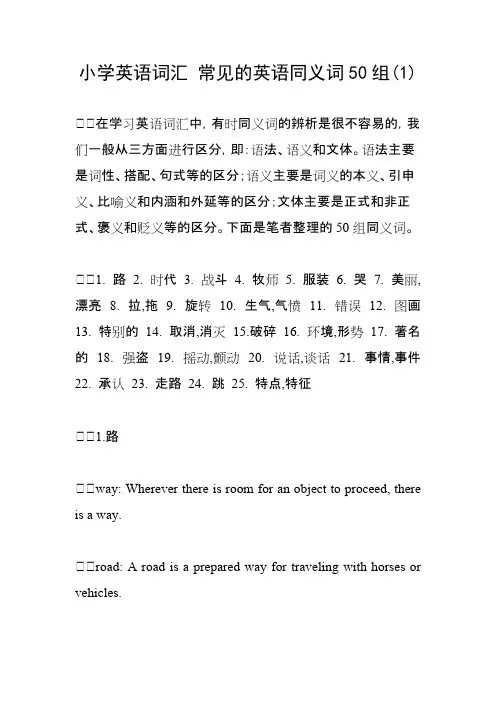
小学英语词汇常见的英语同义词50组(1) 在学习英语词汇中,有时同义词的辨析是很不容易的,我们一般从三方面进行区分,即:语法、语义和文体。
语法主要是词性、搭配、句式等的区分;语义主要是词义的本义、引申义、比喻义和内涵和外延等的区分;文体主要是正式和非正式、褒义和贬义等的区分。
下面是笔者整理的50组同义词。
1. 路2. 时代3. 战斗4. 牧师5. 服装6. 哭7. 美丽,漂亮8. 拉,拖9. 旋转10. 生气,气愤11. 错误12. 图画13. 特别的14. 取消,消灭15.破碎16. 环境,形势17. 著名的18. 强盗19. 摇动,颤动20. 说话,谈话21. 事情,事件22. 承认23. 走路24. 跳25. 特点,特征 1.路 way: Wherever there is room for an object to proceed, there is a way. road: A road is a prepared way for traveling with horses or vehicles. path: A way suitable to be traveled only by foot passengers or by animals. route: A route is a line of travel, and may be over many roads. street: A street is in some centre of habitation, as a city town or village, when it passes between houses of dwellings. avenue: A avenue is a long, broad and imposing( 壮严) or principal street. 2.时代(期) (时期) period: It indicates any passage of time, great or small. /an extent of time of any length. (时代) time(s): It refers to a period in history. in ancient times/ in Victoria time (新时代) epoch: It indicates a long period of time marked by events or development of a particular kind. The first flight into space marked a new epoch in the history of mankind. (纪元) era: It refers to a very long period of time marked by a particular feature in a great new era of world revolution (时期) age: It shows a particular /a fairly definite period in history. the Bronze Age, Iron Age 3.战斗(打仗) fight: It is a bodily struggle (奋斗斗争) struggle: An effort of any kind to overcome difficulty. (战斗) battle: A fight between armed forces. (战役) campaign: A series of related military operations in a war. (战争) war: A period of fight between countries or states when weapons are used and many people are killed. (对抗) combat: A fight, conflict, controversy. 4.牧师(教士牧师) priest: A person, esp. a man specially trained for various religious duties and ceremonies, in the Christian church, esp. in the Roman Catholic church (牧师) minister: A member of clergy, esp. Protestant churches. (牧师) clergy(pl): The officially appointed leader of thereligious activities of a particular church or temple. clergyman: clergymen(pl) a member of clergy. (牧师) pastor: A Christian religious leader in charge of a church and its members, esp. in a Protestant church. (教区牧师) vicar: A priest in charge of an area(parish) in the church of England. father: A little of respect for a priest, esp. in the Roman Catholic. 5.服装 clothing(collect): (fml) General term of clothes. clothes(no single): Coverings of the body such as coats, dresses, suits, shoes, hats. garment(fl): A suit of clothes used by actors./a single articleof clothing. costume: 1) The fashion of dress peculiar to a people, nation, class, period, etc. 2) A dress worn by actors in a play. uniform: worn by all members of the community. dress: 1) A kind of outer garment worn by women (连衣裙). 2) worn on special occasions (礼服) evening dress/ morning dress suit: A set of outer clothes to be worn together. evening suit/swimming suit coat: A garment with sleeves worn on top of other clothes from rain, heat, etc. overcoat: A warn coat worn in the street. 6.哭 cry: The most general one. (哭泣) weep: To let flow tears. (抽泣抽嗒) sob: To weep or sigh with short quick breaths. (哭天抹泪涕泪交流) snivel: To sniffle and cry in a irritating manner. (哭嚎又哭又闹) blubber: To cry loudly noisily. (发出低声报怨声) whine: To make a low complaining cry. (嚎哭) bawl: To utter loud cries (always in bad sense). (痛哭) wail: To cry aloud from pain or sorrow. (呻吟) moan: To make a low, miserable sound in pain or sorrow. (呻吟) grown: To make a low sound of pain, unhappiness ordisapproval (哀悼) mourn: To feel or show sadness or sorrow for someone who has died. (哀悼) lament: To express great sorrow or regret. 7.美丽漂亮 good-looking: Having an attractive appearance in a strong, healthy way used for men and women not things. beautiful: ( a woman or a thing) Suggesting symmetry of features or perfection of proportion, elegance and mobility. beautiful flowers, a beautiful girl/voice/city/face beautiful weather. handsome: Of attractive appearance applies to men. a handsome fellow/actor/horse/buildings/young man. pretty: (a girl, or a small thing) Suggesting liveliness and sweetness, pleasing or nice to look at. a pretty littlewoman/garden, a pretty girl/ picture/piece of music, lovely: (something) So beautiful that it makes you feel good to look at it or even to think about it. The garden looks lovely. fair: Beautiful( of woman in poet) light in color esp., skin hair. gorgeous: (persons or things) (inf) Extremely beautiful or handsome. 8.拉拖 pull: The most general one. draw: It implies a smoother, steadier motion and generally a lighter force than pull. drag: It usually refers to horizontal motion or motion up an incline (slope) and it suggests laborious efforts over rough ground or against friction, resistance or gravity. The escaped prisoner was dragged out of his hiding place. haul: It implies continuous pulling or dragging of heavy or bulky objects. The fisherman is hauling a net. tug: It applies to hard often sudden violent effort to pull. He tugged at my sleeve to ask directions. jerk: To pull suddenly. He jerked out the knife that was stuck in the wound. tow: To pull by a rope or chain. We towed the car to the nearest garage. wrench: To pull hard with a twisting or turning movement. 9.旋转turn: The most general one. (自转) spin: To turn quickly around a central point. It emphasizes the continuity of the action, and usually the narrow extent of the circular motion. The wheel is spinning on its axis. (急转) whirl: To round very fast. It implies the lock of conscious control. The leaves whirl in the wind in the yard. (转动) rotate: To turn round a fixed point with a circular movement. The earth rotates once every 24 hours. (绕转) revolve: To turn or move in a circle around a central point. It indicates circular or elliptical (椭圆) movement. The planets revolve around the sun. 10.生气气愤 anger: The most general one. (易怒) be cross: Feeling easy to get angry. (愤慨) indignation: (fml) Anger. It stresses righteous anger at what one considers unfair, mean or shameful. We expressed our indignation at the ruthless exploitation. (愤怒) wrath: Very treat anger. (literary) It suggests a desire on intent to revenge or punish. (狂怒) rage: Wild, violent anger. It suggests loss of self- control from violence of emotion. in a rage /to fall into a rage. (暴怒) fury: Violent, extreme and destructive anger. She flew into a fury. 11.错误 (误会) mistake: A wrong thought, act. It implies carelessness Anyone can make a mistake. (过错弱点) fault: A bad point, but not of a serious moral kind. It refers to behavior and character. His only fault is that he lacks ambition. find fault with sb / at fault shortcoming: Weakness, failing It refers to failures or deficiencies in things as well as people. In spite of all her shortcomings I still think she's one of the best teachers in the school. (疏忽) error: A mistake (formal sometimes literary) It implies deviation from a standard or model The accident was caused by human error. (缺点毛病) defect: sth lacking or imperfect. It refers to quality. The radio was returned because of a defect. (失误过失) blunder: A very stupid or unnecessary mistake. It implies ignorance. This is the fatal blunder of his life. 12.图画 picture: The most general one. (彩图) painting: pictures with color. (绘画图画) drawing: A picture made with a pen, pencil and crayon. Sketch, diagrams and graphs are all drawings. (草图) sketch: A rough not detailed drawing. (图解图表) diagram: A drawing, figure that shows the arrangement of something. (曲线图) graph: A diagram in which a straight line, curved, or zigzag line shows how two sets of numbers or measurements are related. (插图) illustration: A picture to go with words of a book. (图样草图) draft: The first rough written form of anything. (平面图) plan: A line drawing of a building as it might been seen from above. (主视图) elevation: A flat upright side of a building. (海图) chart: A map esp. a detailed map of a sea area. 13.特别 (专门的,与众不同的) special: Different in some way from what is common, ordinary, or usual. It stresses having a quality, character, identity, or use of its own. The tube contains special gases. (特别的) especial: (fml) To an usually great degree, exceptional It emphasizes the importance of the things or the persons mentioned This is a matter of especial importance. (各别的) particular: Relating or belonging to only one thing or person. It stresses the distinctness of something as an individual which is worth notice. In that particular case, the rule doesn't hold.(适用) (特种的) specific: Detailed and exact, clear in meaning and explanation, fixed, determined.(used in scientific articles) It implies a quality or character distinguishing a kind or a species. He gave me a very specific instruction. There is a specific tool for each job. (独特的) peculiar: Strange or perhaps unpleasant. It implies strangeness. He has a peculiar way of speaking. 14.取消消灭 (取消解除) cancel: To give up, to declare something is to be effective. He has cancelled his leave of absence.(消假) (废除废止) abolish: To do away with. It refers to practices, social institutions. Bad customs should be abolished. (消灭排除) eliminate: To get rid of. We should eliminate the false and retain the true. (撤消废除) repeal: To bring to an end of the effect of a law or an order. Some laws should be repealed. (根除消灭) exterminate: To destroy completely and wholly. Colonialism must be exterminated. 15.破碎 break: The most general one. (压碎压破) crush: To press together violently as to break, to destroy its shape by squeezing it. It suggests the effect of great external pressure. The tree fell on top of the car and crushed it. (打碎) smash: To break thoroughly to pieces with a crushing sound. She dropped the plate and smashed it. (打裂) crack: To break without separation of parts. It suggests the breaking out across a surface. He cracked the window by leaning against it. (破裂) burst: To break open by pressure from within. The fireworks burst while they were in the air. (砸碎破碎) shatter: To break into pieces. It suggests the breaking up of a thin surface. The glass was shattered to pieces. (撞坏) crash: To refer to the vehicle which hits something and is badly damaged. 16.环境形势 (环境形势) conditions: The location and other factors likely to affect it. It suggests something that has stayed the same for some time and which affects daily life such as food, work, and houses. We are now studying the economic conditions in the developing countries. (形势) situation: A position or state at a particular time, set of conditions, facts, and events having an effect on a person, society, etc. It suggests more general matters such as government planning and finance. The political situation in these countries are always changing. (环境周围外界) environment: The circumstances, things and conditions that influence you. It refers to spirit aspect, physical aspect and material aspect. We must try to beautify our environment. (形势情况) circumstance(s): A situation or event around us, a certain kind of atmosphere, the conditions that affect what happens. in (under) the circumstances (环境周围事物) surrounding(s): The area and environmentaround a place or person. It indicates a very narrow condition, "physically" sometimes reflects spiritual aspect. They lived in hostile surroundings. 17.著名的 well-known: (infl) famous: The most general one. widely known or honored. (杰出的知名的) distinguished: Great, outstanding marked by excellent quality or deserved fame, used especially of people who are famous for serious work in science, the arts etc. He was a distinguished writer. (驰名的) celebrated: Famous, (substitute for renowned) It refers objectively to sb or something that has been giveacclaim or honoured with awards or prizes. She was a celebrated actress. renowned: Highly honored and famous for something good. often refers to places or things, also It suggests something that has become legendary or is no longer available for an objective evaluation. Edison was renowned for his inventions. noted: Well-known and admired It often describes a more intellectual kind of effort and accomplishment indicating an authority or expert or their theories. Maybe it is not widely known to the general public. He was a very noted expert. (臭名昭著) notorious: Famous for something bad. He is notorious for his crimes. 18.强盗 thief: The most general one. (强盗) robber: It suggests a direct confrontation in which the owner is forced to give up his valuables. (行凶强劫) mugger: A person who attacks and robs people in a street or in a lift. burglar: A person who breaks into a house at night to steal something. (歹徒暴徒) gangster: A member of a group of criminals, esp. those who are armed and use guns to threaten. (匪徒) bandit: an armed robber. It suggests an organized group in a rural setting. (土匪) brigand: A robber who lives by robbing travelers in the country. (海盗) pirate: A person who robs on the sea. 19.摇动,颤动 shake: The most general one. to move up and down or back and forth. It refers to persons or things. (发抖) quiver: To tremble a little. It suggests a rapid but invisible vibration. His lips quivered with emotion. (颤抖) tremble: To shake uncontrollably and slightly as from fear, cold, excitement etc. It implies uneasiness and nervousness. Her voice trembled as she began to sing. (瞬间发抖) shiver: To tremble from fear or cold. It suggests a slight and rapid movement. He stood shivering in the snow. (极度颤动) quake: to shake or tremble violently. It suggests a more violent and sudden change. He quaked with excitement. An explosion cam make the ground quake. (抽筋般颤动) shudder: To shake uncontrollably for a movement. It suggests a more intense shaking. She shuddered at the sight of a snake. 20.说话谈话 (说话) speak: To use your voice to say words. (说) say: To speak words. (发出声音) utter: To make sound and say words. drawl: To speak in a slow, prolonged manner. mutter: To express displeasure with compressed lips. rave: To talk in an angry, uncontrolled way. gabble: To talk rapidly, making inarticulate sounds. (谈论) remark: To mention it or comment on it. (陈述) state: To say, express or put into words, esp. formally. He stated his view. (讲述) narrate: To tell formally in writing or speech or describe something in order with intonation. He narrated his adventure in the forest. (详述) relate: To tell formally in details, to give an account of. He related his experiences. (讲演) address: To say in speech or writing to a person or group. tell: To let people know about something. talk: To say things to someone. converse: To talk formally. The scholars are conversing with each other on linguistics. chat: To talk in a friendly, familiar, informal manner. The two friends sat in a corner and chatted. chatter: To talk continuously rapidly about small things. The schoolgirls went along chattering. whisper: To talk in a low voice. She whispered me not to talk so loudly. murmur: To make a soft sound, esp. to speak or say in a quiet voice. He often murmurs to himself. (闲谈) gossip: To talk about the details of other people's actions and private lives which may not correct or proper. That woman is very fond of gossiping about others. stammer: To speak with pauses and repeated sounds because of excitement, embarrassment. stutter: To speak with pauses and repeated sounds because of inherent speech defect. 21.事情,事件 (事) thing: An event, a fact, a subject. He talked of many interesting things. (事情) matter: Seth that you have to deal with, something to be discussed, thought over. There are several matters to be dealt with at the meeting. (事务责任) business: A special duty, something that has to be done. Public business is every one's business. (事务) affair: An event or set of connected events. (pl) private and personal life. I have many affairs to look after. (事件) event: An important happening. Events such as birthdays and anniversaries are often celebrated. Do you know the chief events of 1986. incident: Not as important as an event. Incidents seldom arecelebrated. Sometimes an event becomes an incident after many years have passed. (偶然事件) happening: An occurrence, and sometimes an unusual one. There have been strange happenings here lately. (偶发事件) occurrence: An incident that is usually unexpected and has not been planned ahead of time. Flood is practically an annual occurrence in this district. 22.承认admit: To agree to the truth of, usu, something bad. It suggests reluctance or possible objection. He admitted his crime/stealing. (自白供认) confess: To admit guilt as to a crime or as to a shortcoming, in the sense of making known to others one's own error or wrong doing. He confessed his fault/doing something wrong. acknowledge: to agree the truth of, recognize the fact or existence of what have said or done, good or bad. It emphasizes openly in a embarrassing or awkward and usually not voluntary way. I acknowledged my signature/mistakes/errors/having been defeated. grant: To admit or to agree something is true. I granted his request/his honesty. take sth/sb for granted. concede: To admit as true, just or proper often unwillingly because of overwhelming evidence. I conceded you that point, but I still think you are wrong. recognize: To accept or acknowledge it. It refers to something about law and diplomacy. The new regime was recognized by China. 23.走路 walk: The most general one. stride: To walk with long steps. He strode through the station a few minutes before the train left. (高视阔步) stalk: To walk stiffly, slowly, and proudly with long steps. trot: To jog, move quickly, usu refers to horses. (蹒跚而行) waddle: To walk from side to side with shortsteps like a duck. The fat man waddled out of the room. (蹒跚) stagger: To walk unsteadily, slide and drag the feet almost falling at each step, usually because of illness, injury or drink. After drinking too much, he staggered in the street. (摇摆蹒跚) totter: To walk unsteadily showing great weakness often used of very young children learning to walk. The child tottered before his parents. (拖着脚走) shuffle: To move without lifting the feet clear of the floor as if wearing slippers. The old man shuffled along the road. (趾高气扬地走) strut To walk in a proud strong way, esp. with the chest out and trying to look important. (慢行) amble: To walk at an easy gentle rate. It stresses a leisurely but regular movement. (闲逛) stroll: To walk, esp. slowly, for pleasure. It emphasizes a slower movement, more wandering and aimless with suggestions of many starts and pauses. They are strolling through this park. saunter: A little more formal than stroll. (漫步徘徊) wander: To move about without a fixed course, aim, or purpose. He was wandering about/down/through/up and down the street. (漫游) roam: To wander with as very clear aim. It suggests a more serious purpose behind the irregular of circular movement in complete forgetfulness of time. The lovers roamed around/through the fields. (跋涉) trudge: To walk heavily and wearily with effort as when one (plod) is tired. The hunter was trudging through the deep snow. (重步行走) tramp: To walk with firm heavy steps. Who has been tramping all over the carpet in muddy shoes. (扭扭捏捏地走) mince: To walk with little short steps in an affected manner. It was a funny sight to see her mince along. slouch: To walk in a loose, ungainly (不雅观) way. hustle: To walk in a busy, active way. 24.跳 jump: The most general one. to throw oneself into the air. (跳起) leap: (literary) To spring through the air, often landing in a different place. The boy leaped over the brook without difficulty. (跳跃) spring: To leap suddenly and quickly. He sprang to his feet at the sudden noise. (跳着跑) bound: To spring lightly along. It suggests high spirits and excitement. His dog bounded to meet me. (轻快地跑) skip: To move in a slight dancing way, as with quick steps and jumps. The little girl skipped at her mother's side. hop: To jump on one leg. The boy had hurt his leg and had to hop along. vault: To leap over something using the hands or a pole. You can vault a fence by putting your hands on it and swinging yourself over. hurdle: To jump over some thing while running. The horse hurdled the fence and ran into the woods. 25.特点特征 quality: The most general one. (特点) characteristic: Quality typical of a particular person and thing, a special and easily recognized quality of sb/sth. It has may scientific or technical uses. It implies neutral description in referring to any aspect of something without evaluating its relative importance to the whole. A useful characteristic of the cat is its ability to catch and kill mice. (特征) character: The combination of qualities which make a particular person, thing, place, etc. A tendency not to show emotions is supposed to be part of the British national character. (性质) nature: The qualities make someone or something different from others. It indicates the widest range of traits, including emotional, mental and physical qualities. It is only human nature to like money. (特征) attribute: A quality belonging to or forming part of the mature of a person or thing. The word is positive rather than negative. Darkness is an attribute of night. (特性) peculiarity: The quality of being peculiar, strangeness, unusualness. It shows an unpleasant attribute that is quite noticeable. One of his peculiarities is that his two eyes are not the same size. (特色) feature: A typical and noticeable part or quality. It suggests something positive and specifically It refers to physical appearance. A lake is an important feature in this area. (品质特性) trait: A particular quality of sb/sth. It refers to more abstract attributes. Honesty and diligence are the chief traits of his character. (个性) personality: The whole nature or character of a particular person. It refers to the whole indefinable emotional coloration that a specific person gives off. He has a strong personality.小学英语词汇常见的英语同义词50组(2)时间:2009年03月03日作者:匿名来源:网络 26. 增加27. 笑28. 疯29.味道30. 滑31. 怕32. 闪光33. 大34. 感情35. 工作,职业36. 停止37. 旅行38. 抓,握39. 看,凝视40. 静41. 消灭42. 结果43. 表明,代表44. 帮助45. 获得,得到46. 礼品,礼物47. 愚蠢48. 地区49. 会议,集会50. 成就,功绩 26.增加 increase: To make or become larger in amount or number. it refers to quantity or intensity as well as size. The population of this county has increased. add: To put together with something else so as to increasethe number size, importance. He added some wood to increase the fire. (扩大) enlarge: To grown larger or wider. I want to enlarge this photograph/house. (放大) magnify: To make something appear larger than in reality, esp. by means of a lens. You have magnified the peril. (扩充) amplify: To make large or fuller, esp. give fuller information, more details etc. to amplify a radio signal/sound. augment: (fml) To become larger or greater. It emphasizes the action of addition. He augmented his income by writing some short stories. (扩展扩张) expand: To increase in range scope or volume as well as in size. Iron expands when it is heated. (加长) extend: To make longer in space or time, to extend a railway. Can't you extend your visit for a few days. 27.笑 (微笑) smile: The corners of your mouth move outwards and slightly upwards. He smiles his consent./with satisfaction. (大笑) laugh: To make a noise to show one's amusement and happiness. You can laugh at a joke or at an amusing sight. You can laugh at someone without being amused. They all laughed loudly. (露齿而笑) grin: To smile with the teeth. The boy grinned from ear to ear when I gave him a sweet. (暗笑含笑) chuckle: To laugh quietly. I could hear him chuckling to himself as he read that funny article. (咯咯笑) giggle: To laugh repeatedly foolishly and uncontrollably, esp. by girls. I heard them giggle when I passed by the girls. (窃笑暗笑) snicker: To laugh in a disrespectful more or less secret way. On hearing his absurd opinion, I went snickering. (假笑痴笑) simper: To smile in a silly unnatural way. When I told him the thing, he simply simpered. (得意的笑) smirk: To smile in a false or too satisfied way. He smirked at everyone that passed. (窃笑) titter: To laugh very quietly from nervousness or badly controlled amusement. The girls tittered when they heard this. (狂笑) guffaw: To laugh loudly and rudely. All the people guffawed at his silly words. (哄笑) roar: To laugh long and loudly. They roared after they heard the joke. (欢笑) chortle: To give a laugh of pleasure or satisfaction. He chortled with delight when I told him the news. (笑骂) taunt: To try to make sb angry, or upset by making unkind remarks, laughing at faults or failures. They taunted her with her inability to swim. (嘲笑嘲弄) ridicule: To laugh unkindly at or to make unkind fun of. They all ridiculed the idea. (讥笑) deride: To laugh at or make fun of as of no value. /to mock at someone with contempt They all derided his foolishness. (嘲弄) mock: To laugh at sb(sth) when it is wrong to do so, esp. by copying in a funny or contemptuous way. The students mocked the seriousness of his expression. twit: (infl) To make fun of sb because of behavior, a mistake, a fault, etc. He twitted her with her timidity. (嘲笑轻蔑地笑) scoff: To laugh at, to speak or act disrespectfully. /to speak in scornful mocking way. It was a great invention but at first many people scoffed at it. (戏弄) chaff: (infl) To make fun of sb in a good-humored way. He chaffed the man about his mistakes in speaking English. (讥笑) jeer: To laugh rudely at /to insult sb in a loud, unpleasant way. They always jeer at the priests. gibe(jibe): To laugh at with the intention of hurting the feeling with sarcastic remarks. Don't gibe at her behavior until you know the reason for it. (讥笑冷笑) sneer: To express proud dislike by a kind of usu, one- side。
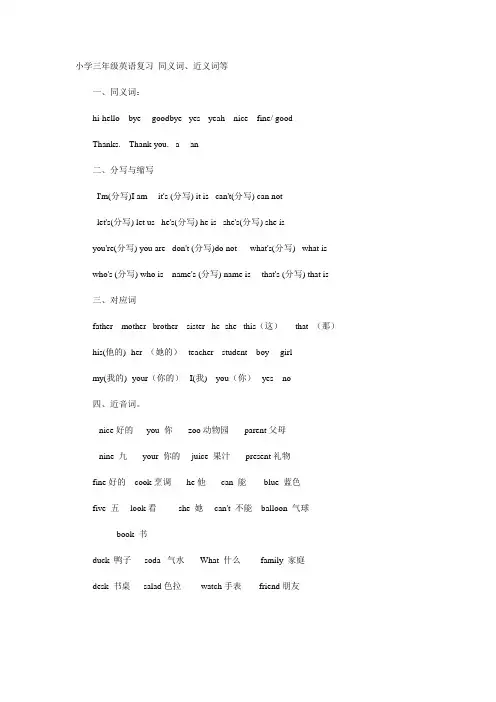
小学三年级英语复习同义词、近义词等一、同义词:hi-hello bye ---goodbye yes --yeah nice---fine/ goodThanks.---Thank you. a ---an二、分写与缩写I'm(分写)I am it's (分写) it is can't(分写) can notlet's(分写) let us he's(分写) he is she's(分写) she isyou're(分写) you are don't (分写)do not what's(分写) what iswho's (分写) who is name's (分写) name is that's (分写) that is三、对应词father---mother brother---sister he -she this(这)---that (那)his(他的) -her (她的)teacher---student boy ---girlmy(我的) -your(你的)I(我)---you(你)yes---no四、近音词。
nice好的you 你zoo动物园parent父母nine 九your 你的juice 果汁present礼物fine好的cook烹调he他can 能blue 蓝色five 五look看she 她can't 不能balloon 气球book 书duck 鸭子soda 气水What 什么family 家庭desk 书桌salad色拉watch手表friend朋友ice 雪what 什么she 她is 是rice 米饭what's 是什么she's 她是isn't 不是red 红色an 一个(只…)it它read 阅读ant蚂蚁is 是bread 面包and 和it's它是cat猫ten十lemon 柠檬hat帽子pen 钢笔melon 甜瓜五、同音词he's他是---his他的Oo----oh噢Uu---you你六、复数1、直接加"s"table-tables book-books cat---cats goat----goatspiano---pianos TV---TVs egg-eggs hat-hats2、辅音+ y 结尾,把y 改iesbaby---babies family-families3、特殊变化ox-oxen七、同义词paint ( 涂油漆)---draw (绘画)八、is、am、are 的用法I 用am, You 用are, is 用于he, she, it和单数,名词复数全用are, are, are,要想提问be 题前,否定not在be后面。
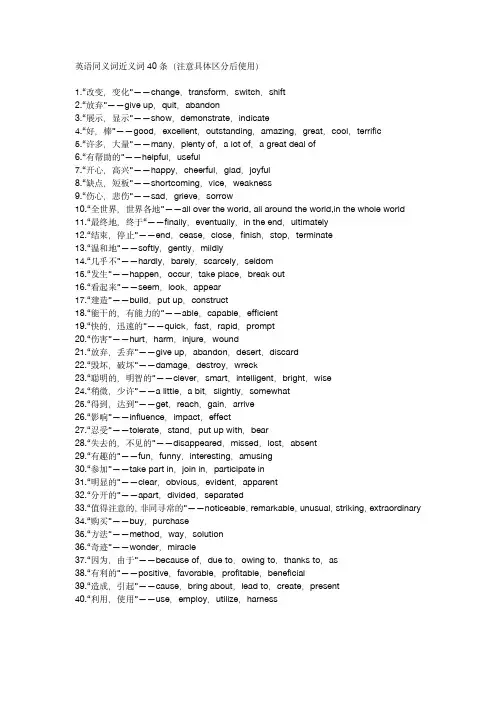
英语同义词近义词40条(注意具体区分后使用)1.“改变,变化”——change,transform,switch,shift2.“放弃”——give up,quit,abandon3.“展示,显示”——show,demonstrate,indicate4.“好,棒”——good,excellent,outstanding,amazing,great,cool,terrific5.“许多,大量”——many,plenty of,a lot of,a great deal of6.“有帮助的”——helpful,useful7.“开心,高兴”——happy,cheerful,glad,joyful8.“缺点,短板”——shortcoming,vice,weakness9.“伤心,悲伤”——sad,grieve,sorrow10.“全世界,世界各地”——all over the world,all around the world,in the whole world11.“最终地,终于“——finally,eventually,in the end,ultimately12.“结束,停止”——end,cease,close,finish,stop,terminate13.“温和地”——softly,gently,mildly14.“几乎不”——hardly,barely,scarcely,seldom15.“发生”——happen,occur,take place,break out16.“看起来”——seem,look,appear17.“建造”——build,put up,construct18.“能干的,有能力的”——able,capable,efficient19.“快的,迅速的”——quick,fast,rapid,prompt20.“伤害”——hurt,harm,injure,wound21.“放弃,丢弃”——give up,abandon,desert,discard22.“毁坏,破坏”——damage,destroy,wreck23.“聪明的,明智的”——clever,smart,intelligent,bright,wise24.“稍微,少许”——a little,a bit,slightly,somewhat25.“得到,达到”——get,reach,gain,arrive26.“影响”——influence,impact,effect27.“忍受”——tolerate,stand,put up with,bear28.“失去的,不见的”——disappeared,missed,lost,absent29.“有趣的”——fun,funny,interesting,amusing30.“参加”——take part in,join in,participate in31.“明显的”——clear,obvious,evident,apparent32.“分开的”——apart,divided,separated33.“值得注意的,非同寻常的”——noticeable,remarkable,unusual,striking,extraordinary34.“购买”——buy,purchase35.“方法”——method,way,solution36.“奇迹”——wonder,miracle37.“因为,由于”——because of,due to,owing to,thanks to,as38.“有利的”——positive,favorable,profitable,beneficial39.“造成,引起”——cause,bring about,lead to,create,present40.“利用,使用”——use,employ,utilize,harness。
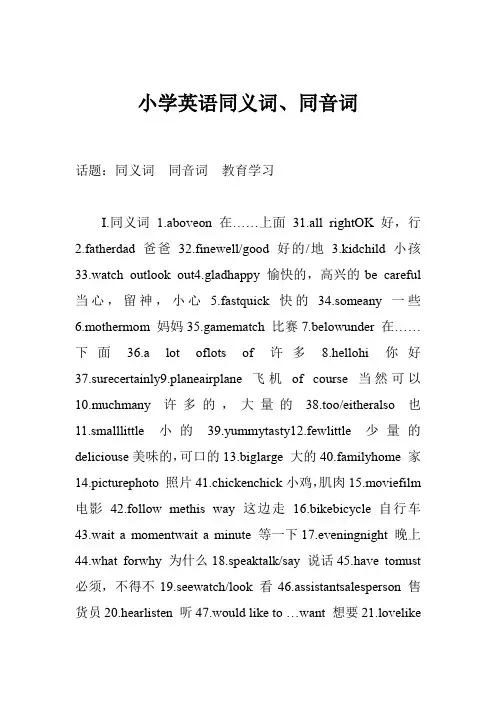
小学英语同义词、同音词话题:同义词同音词教育学习I.同义词 1.aboveon 在……上面31.all rightOK 好,行2.fatherdad 爸爸32.finewell/good 好的/地3.kidchild 小孩33.watch outlook out4.gladhappy 愉快的,高兴的be careful 当心,留神,小心5.fastquick快的34.someany 一些6.mothermom 妈妈35.gamematch 比赛7.belowunder 在……下面36.a lot oflots of 许多8.hellohi 你好37.surecertainly9.planeairplane 飞机of course当然可以10.muchmany 许多的,大量的38.too/eitheralso 也11.smalllittle 小的39.yummytasty12.fewlittle 少量的deliciouse美味的,可口的13.biglarge 大的40.familyhome 家14.picturephoto 照片41.chickenchick小鸡,肌肉15.moviefilm 电影42.follow methis way 这边走16.bikebicycle 自行车43.wait a momentwait a minute 等一下17.eveningnight 晚上44.what forwhy 为什么18.speaktalk/say 说话45.have tomust 必须,不得不19.seewatch/look 看46.assistantsalesperson 售货员20.hearlisten 听47.would like to …want 想要21.lovelike喜欢48.eat/drinkhave 吃,喝22.giftpresent 礼物49.play sportsdo sports 做运动ughsmile 笑50.autumnfall 秋天24.shopstore 商店51.wait a minutehold on 等一下25.hatedislike 讨厌,不喜欢52.take picturestake photos 照相26.learnstudy 学习e frombe from 来自27.dearexpensive 昂贵的54.very muchso much 很,非常28.beginstart 开始55.what about...how about……怎样呢?29.fasterquicker 更快的56.sourtart 酸的30.goodbyebye 再见57.forestwoods 森林I.同义词58.be at homebe in 在家23.meet/meat遇见/肉59.get toarrive 到达24.Its/it’s它的/是它60.next to/besidenear 在……附近25.by/bye/buy乘/再见/购买61.look forfind 找26.wait/weight等/体重62.take care oflook after 照顾,照看27.one/won一/赢(过去式)63.Don’t worry .Tahe it easy .别担忧!28.hour/our小时/我们的64.father’s fathergrandfather 爷爷29.here/hear这儿/听II.同音词30.red/read红色的/读(过去式)1.Bb/be/bee是/蜜蜂31.board/bored写字板/无聊的/sea/see海洋/看见3.I/eye 我/眼睛4.Oo/oh哦5.Pp/pea豌豆6.Qq/queue队列7.Rr/are是8.Tt/tea茶9.Uu/you你/你们10.Yy/why为什么11.too/two/to 也/二/到12.there/their哪里/他们的13.write/right写/正确的,右14.deer/dear鹿/亲爱的15.four/for四/为,给16.hair/hare头发/兔子17.know/no知道/不18.where/wear在哪里19.pear/pair梨子/对,双20.week/weak星期/虚弱的21.sun/son太阳/儿子22.aunt/aren’t姨/不是23.whose/who’s谁的/是谁。
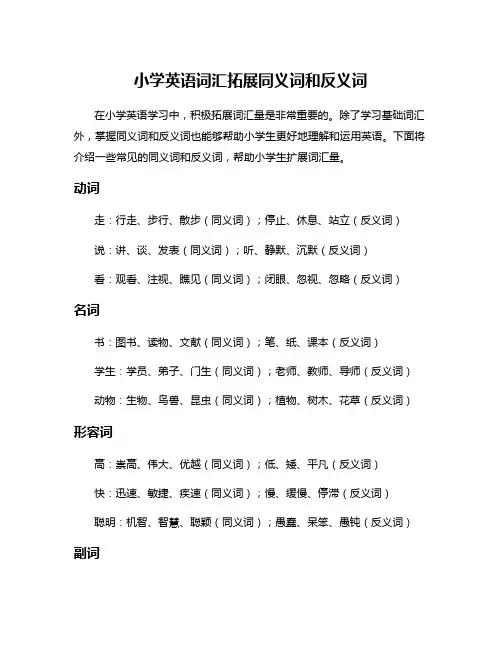
小学英语词汇拓展同义词和反义词
在小学英语学习中,积极拓展词汇量是非常重要的。
除了学习基础词汇外,掌握同义词和反义词也能够帮助小学生更好地理解和运用英语。
下面将介绍一些常见的同义词和反义词,帮助小学生扩展词汇量。
动词
走:行走、步行、散步(同义词);停止、休息、站立(反义词)
说:讲、谈、发表(同义词);听、静默、沉默(反义词)
看:观看、注视、瞧见(同义词);闭眼、忽视、忽略(反义词)
名词
书:图书、读物、文献(同义词);笔、纸、课本(反义词)
学生:学员、弟子、门生(同义词);老师、教师、导师(反义词)动物:生物、鸟兽、昆虫(同义词);植物、树木、花草(反义词)形容词
高:崇高、伟大、优越(同义词);低、矮、平凡(反义词)
快:迅速、敏捷、疾速(同义词);慢、缓慢、停滞(反义词)
聪明:机智、智慧、聪颖(同义词);愚蠢、呆笨、愚钝(反义词)副词
快速:迅速地、敏捷地、飞快地(同义词);慢慢地、缓慢地、停顿地(反义词)
仔细:细致地、周密地、深入地(同义词);粗心地、马虎地、草率地(反义词)
很:非常、极其、十分(同义词);不、没、无(反义词)
通过学习同义词和反义词,小学生可以更加灵活地运用词汇,增强语言表达能力,提高英语写作和口语表达水平。
拓展小学生的英语词汇量是英语学习中的重要一环。
掌握同义词和反义词不仅可以增加词汇量,还可以提升语言表达的多样性和准确性。
希望小学生们在学习过程中能够多多探索,积极运用所学,不断提升自己的英语水平!。
小学英语同义词、近义词汇总Above—on(在...上面)father---dad(爸爸)glad---happy(高兴地)Fast---quick(快的)mother---mum/mom hello---hi(嗨)Much---many(许多)few---little极少small---little(小的)Big---large(大的)picture---photo(图片)movie---film(电影)Bike ---bicycle(自行车)begin---start(开始)evening---night(夜晚)Speak---talk---say(说)see---watch---look(看)hear---listen(听)Love---like(喜欢)gift---present(礼物)laugh---smile(笑)desk---table (桌子)learn---study(学习)too---also(也)problem---question(问题)often---usually(经常)job---work(工作)dinner---supper(晚餐)high---tall(高的)autumn---fall(秋天)beautiful--pretty--nice小学英语反义词汇总F ast/quick(快的)---slow(慢的)laugh(笑)---cry(哭)good(好的)---bad(坏的)small(小的)---big(大的)close(关)---open(开)long (长的)---short(短的)far(远的)---near(近的)Left(左)---right(右)finish(结束)---begin/start(开始)much---little (少)high(高)---low(低)always(总是)---never(从不)new (新)---old(旧)fat(胖)---thin(瘦)cool(凉爽的)---warm(温暖的)cold(寒冷的)---hot(炎热的)late(迟)---early(早)up(向上)---down (向下)first(首先)---last(最后)heavy(重的)---light(轻的)few(很少)---many(很多)sit(坐)---stand(站)yes(是)---no (不)go(去)---come(来)take(拿走)---bring(拿来)Behind(在---后面)---in front of(在---前面)clean(干净的)---dirty (脏的)cheap(便宜的)---expensive(昂贵的)short(矮的)---tall (高的)in(在---里面)---out(在---外面)quiet(安静的)---noisy (吵闹的)outside(外面的)---inside(里面的)wrong(错误的)---right (正确的)young(年轻的)---old(年老的)after(在---后)---before (在---前)happy(高兴地)---sad(伤心的)weak(弱的)---strong (强壮的)小学英语对应词汇总These(这些)---those(那些)this(这些)---that(那些)man(男人)---woman(女人)girl(女孩)---boy(男孩)grandfather(祖父)---grandmother(祖母)grandpa(祖父)---grandma(祖母)Brother(兄弟)---sister(姐妹)uncle(叔叔)---aunt(阿姨)Here(这里)---there(那里)white(白色)---black(黑色)night(夜晚)---day(白天)小学英语同音词汇总Cc---see(看见)---sea(大海)Ii---I(我)---eye(眼睛)Rr---are(是)Tt---tea(茶)Uu---you(你们)Yy---why(为什么)aunt(阿姨)---aren’t (不是)four(四)---for(为了)where(哪里)---wear(穿)high (高的)---hi(喂)hear(听)---here(这儿)know(知道)---no(不)knew(know的过去式)---new(新的)meet(遇见)---meat(肉)hour(小时)---our(我们的)pair(一双)---pear(梨)there(那里)---their(他们的)son (儿子)---sun(太阳)Two(二)---too(也)---to(到)who’s(谁是)whose(谁的)Week(星期)---weak(虚弱的)red(红色)---read(read的过去式)right(正确的;右边)----write(书写)by(在---旁边)---bye(再见)---buy(买)it’s(它是)---its(它的)one(一)---won(win的过去式)road(道路)---rode(ride 的过去式)一、复数1. yourself(复数形式)yourselves2.knife(复数形式)knives 3.fish(复数形式)fishes 4.meat(复数形式)meat5.rice(复数形式)rice 7. bread(复数形式)bread 8. is(复数形式) are二、单数1.we(单数)I2. they(单数)he/she/it三、现在分词/ing形式1.swim/ swimming2.have/having3.make/makinge/coming5.take/taking6.boat/boating7.do/doing 8.keep/keeping 9.run/running10.rain/raining 11.climb/climbing四、过去分词/过去式1.go/went2.get/got3.see/saw4.is/was5.do/did6.are/were7.have/had 9.give/gave 10.make/made11. begin/begun。
小学英语近义词小学英语近义词大全近义词,是指词汇意义相同或相近的词语,下面小编为大家搜索整理了小学英语近义词大全,欢迎阅读借鉴。
小学英语近义词1、listen-hear2、class-lesson3、everyone-everybody4、 glass-cup5、large-big6、 glad-happy7、like-love8、 little-small9、start-begin10、near-beside11、like-want12、for-find13、photo-picture14、hi-hello15、home—house16、 learn-study17、beautiful-pretty18、usually-often19、look-see20、bicycle-bike21、quick-fast22、garden-park23、desk-table24、speak-say-talk25、be good at-do well in26、rive-lake27、 go home-come home28、of course-sure29、a moment ago-just now30、a lot of-lots of-many31、take a bus –by bus32、be from-come from33、take a walk-go for a walk常见英语反义词above 在......上 -- below 在......下after 在......后 -- before 在......前all 全部 -- none 全无answer 回答 -- ask 询问answer 答案 -- question 问题back 后面 -- front 前面bad 坏的 -- good 好的best 最好的 -- worst 最坏的better 更好的 -- worse 更坏的black 黑的 -- white 白的both 两者都 -- neither 两者都不busy 忙碌的 -- free 空闲的buy 买(入) -- sell 卖(出)cheap 便宜的 -- expensive, dear 昂贵的clean 干净的 -- dirty 肮脏的clever 聪明的 -- foolish 愚蠢的cold 寒冷的 -- hot 炎热的come 来 -- go 去cool 凉爽的 -- warm 温暖的danger 危险 -- safety 安全dark 黑暗的 -- bright, light 明亮的day 白天 -- night 夜晚die 死去 -- live 活着down 向下 -- up 向上dry 干燥的 -- wet 潮湿的early 早的 -- late 迟的easy 容易的 -- difficult, hard 困难的;艰巨的empty 空的 -- full 满的entrance 入口 -- exit 出口fall 落下 -- rise 升起far 远的 -- near 近的finish 结束 -- begin, start 开始first 最初的 -- last 最后的foreign 外国的 -- home 本国的forget 忘记 -- remember 记得glad 愉快的 -- sad, sorry 悲伤的;难过的happy 高兴的 -- unhappy, sad 难过的hard 硬的 -- soft 软的hate 憎恨 -- love, like 热爱;喜欢here 在这里 -- there 在那里high 高的 -- low 低的ill 生病的 -- healthy, well 健康的into 到......里面 -- out of 从......到外,在......之外inside 在里面 -- outside 在外面light 轻的 -- heavy 重的lose 丢失 -- find 找到lose 失败 -- win 胜利;赢得miss 未抓住;未赶上 -- catch 抓住;赶上most 最多的 -- least, fewest 最少的move 移动 -- stop 停止never 从不 -- ever 曾经nothing 什么也没有 -- everything一切now 现在 -- then 那时old 旧的 -- new 新的old 年老的 -- young 年轻的pain 痛苦 -- pleasure 快乐pass 通过;及格 -- fail 未通过;不及格poor 贫穷的 -- rich 富裕的pull 拉 -- push 推rainy 下雨的 -- dry 干旱的right 右边(的) -- left 左边(的`)right 正确的 -- wrong 错误的safe 安全的 -- dangerous 危险的same 相同的 -- different 不同的short 短的 -- long 长的short (个子)矮的 -- tall (个子)高的sleep 睡觉 -- wake 醒来small 小的 -- big, large, great 大的start 出发 -- reach 到达strong 强壮的 -- weak 虚弱的take 拿走 -- bring 带来take 拿取 -- give 给予teach 教(课) -- learn 学习thin 瘦的 -- fat 胖的thin 薄的 -- thick 厚的town 城镇 -- country 乡下whole 全体;全部 -- part 部分wide 宽的 -- narrow 窄的with 有 -- without 没有yes 是的 -- no 不是的。
小学英语四年级(上)同音词、近义词、反义词、对应词归纳
(沪教2011课标版三年级起点)
一、同音词
meet (相识、结识)——meat (肉)
his (他的)——he’s
write (写字;书写)——right (正确的)
see (看见)——sea (大海)
aunt (姑妈,婶婶)——aren’t
pair (量词:双,副,条……)——pear (梨)
where (哪里)——wear (穿)
二、近义词(同义词)
want (想要)——would like
三、反义词
new (新的)——old (旧的)
fast (快的;快地)——slow/slowly (慢的;慢地)
happy (开心的)——sad (难过的,悲哀的)
hungry (饥饿的)——full (饱的)
that (那个)——this (这个)
busy (忙碌的,繁忙的)——free (空闲的)
near (近)——far(远)
behind (在……后面)——in front of/before (在……前面)
old (古老的,老的)——young (年轻的)
四、对应词
grandfather (grandpa) (爷爷,外公)——grandmother (grandma) (奶奶,外婆)uncle (叔叔、伯伯、舅舅)——aunt (婶婶、伯母、舅妈)
her (她的)——his (他的)。
小学英语同义词总结(1)above/on (在……上面) (2)f ather/dad(爸爸)(3)kid/child(小孩)(4)glad/happy(高兴)(5)fast/quick (快的)(6)mother/mum(妈妈)(7)below/under(在……下面)(8)hello /hi(嗨)(9)plane/airplane(飞机)(10)much/many(多)(11)few/little(极少)(12)small/little(少量)(13)big/large(大的)(14)picture/photo(图片)(15)movie/film(电影)(16)b ike/bicycle(自行车)(17)begin/start(开始)(18) evening/night(夜晚)(19)speak/talk/say(说)(20) see/watch/look(看)(21)hear/listen(听)(22) love/like (喜欢)(23)gift/present (礼物)(24)laugh/smile (笑)(25)shop /store(商店)(26) hate/dislike(厌恶)(27)learn /study(学习)(28)d ear/expensive(昂贵的)(29)begin/start(开始)(30) too/also(也)(31)problem/question(问题)(32)often/sually(经常)(33)job/work(工作)(34)because/for(因为)(35)dinner/supper (晚餐) (36)high/tall(高的)(37)cup/glass (杯子)(38)meeting/party (会)拓展:1、away 离开—off 离开/走开(通常与不同的动词搭配)2、because 因为(因果语气较强,常搭配句子)—for 因为(因果语气较弱,可搭配短语和句子)3、break 休息/中断(常指短时休息)—rest 休息(相对时间较长)4、cup 小茶杯—glass 玻璃杯5、clothes 衣服(总称)—dress 衣服(长裙、某类衣服的总称,如:evening dress, modern dress)6、dinner 正餐/晚餐—supper 晚餐7、daddy(儿语)爸爸—dad(口语)爸爸—father(书面语)爸爸8、evening 傍晚—night 晚上9、fast 快的—quick 快的10、great 伟大的/大的—big 大的(常指形状的大小)11、hello 喂/hi 嗨(相对较为正式)—hey 喂/嘿(相对较为随便)12、high 高的(通常搭配高山、高楼等)—tall 高的(通常搭配人物、树木等)13、job 职业/工作(可数名词使用)—work 工作(不可数名词)14、Mr.先生(搭配姓氏使用)—sir 先生(通常单独使用表称呼)15、like 喜欢—love 喜爱(喜欢的程度相对较深)16、little 小—small 小17、look 看(表动作)—see 看见(更强调结果)18、listen 听(表动作)—hear 听见(更强调结果)19、meeting 会议—party 聚会20、mummy(儿语)妈妈—mum(口语)妈妈—mother(书面语)妈妈21、ride 骑(马、自行车)—drive 驾驶(车辆)22、often 经常/常常—usually 通常(频度更高)23、picture 照片/图片—photo 照片24、problem 问题/难题—question 问题25、ship 船/轮船—boat 船/小船26、say 说(通常搭配直接引语和间接引语)—speak 说(通常搭配语言,如英语、汉语)—talk 说(通常搭配介词、副词使用,如:talk about, talk with)27、too 也(置于句尾)—also 也(置于句中)28、wear 穿着(较为强调状态)—put on 穿上(强调动作)29、look for 寻找(强调过程)—find 找到(强调结果)小学英语反义词总结(1)quick(快的)/slow(慢的)(2)laugh(笑)/cry(哭)(3)fast(快)/slow(慢)(4)close(关)/open(开)(5)small(小)/big(大)(6)hard(困难的)/easy(容易的)(7)behind(在……后面)/in front of(在……前面)(8)long(长)/short(短)(9)far(远)/near(近)(10)on(在……上面)/under(在……下面)(11)stop(停)/begin/start(开始)(12)left(左)/right(右)(13)bottom(底部)/top(顶部)(14)cool(凉爽的)/warm(温暖的)(15)like(喜欢)/dislike/hate(厌恶)(16)dark(黑暗的)/bright(明亮的)(17)much(多)/little(少)(18)cheap(便宜的)/expensive/dear(昂贵的)(19)always(总是)/never(从不)(20)high(高)/low(底)(21)new(新的)/old(旧的)(22)west (西)/east(东)(23)cry(哭)/laugh(笑)(24)slower(慢的)/quicker/faster(快的)(25)north(北)/south(南)(26)late(迟)/early(早)(27)thin(薄)/thick(厚)(28)outside(外面的)/inside(里面的)(29)quiet(安静的)/loud(大声的)(30)up(向上)/down(向下)(31)happy(高兴的)/sad(昂贵的)(32)short(矮的)/tall(高的)(33)below(在……下面)/above(在……上面)(34)clean(干净的)/dirt(脏的)(35)in(在……里面)/out(在……外面)(36)wrong(错误的)/right(正确的)(37)first(首先)/last(最后)(38)heavy(重的)/light(轻的)(39)young(年轻的)/old(年老的)(40)few(很少)/many(很多)(41)hungry(饥饿的)/full(饱的)(42)after(在……后)/before(在……前)(43)white(白色)/black(黑色)(44)win(胜利)/lose(失败)(45)sit(坐)/stand(站)(46)yes(是)/no(不)(47)go(去)/come(来)(48)different(不同的)/same(相同的)(49)here(这里)/there(那里)(50)wet(湿的)/dry(干的)(51)weak(弱的)/strong(强壮的)(52)safe(安全的)/dangerous(危险的)(53)cold(寒冷的)/hot(炎热的)(54)good(好的)/bad(坏的)(55)short(短的、矮的)/long(长的)/tall(高的)(56)night(夜晚)/day(白天)小学英语对应词汇总1. brother (兄弟)/ sister(姐妹)2. this(这个)/that(那个)3. grandfather(祖父)/grandmother(祖母)4. man(男人)/woman (女人)5. daughter(女儿)/son(儿子)6. mother(母亲)/father(父亲)7. these(这些)/those (哪些)8. girl(女孩)/boy(男孩)9. uncle(叔叔)/aunt(阿姨)10. morning(早晨)/evening(晚上)11. tomorrow(明天)/yesterday(昨天)12. waitress(女服务员)/waiter(男服务员)13. actor(男演员)/actress(女演员)14. wife(妻子)/husband(丈夫)15. girlfriend(女朋友)/boyfriend(男朋友)小学英语同音异形词汇总1. ah(啊)/ are(是)2. aunt(阿姨、姑姑)/aren't(不是)3. bee (蜜蜂)/ be(是)4. by(在旁边)/ bye (再见)/ buy(买)5. dear(亲爱的)/ deer(母鹿)6. four(四)/ for(为了)7. hair(头发)/ hare(野兔)8. hear(听见)/ here(这儿)9. high(高的)/ hi(喂)10. hour(小时)/ our(我们的)11. know(知道)/ no(不)12. meet(遇见)/ meat(肉)13. right(正确的,右边)/ write(书写)14. see (看见)/ sea(海)15. son(儿子)/ sun(太阳)16. there(那里)/ their(他们的)17. two(二)/ too(也)/ to(到)18. way(道路)/ weigh(称)19. where(哪里)/ wear(穿)20. I(我)/ eye(眼睛)。